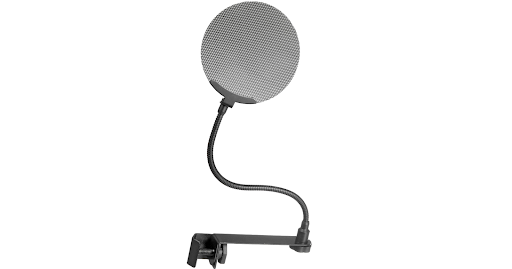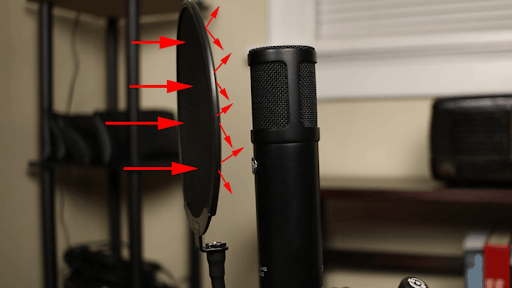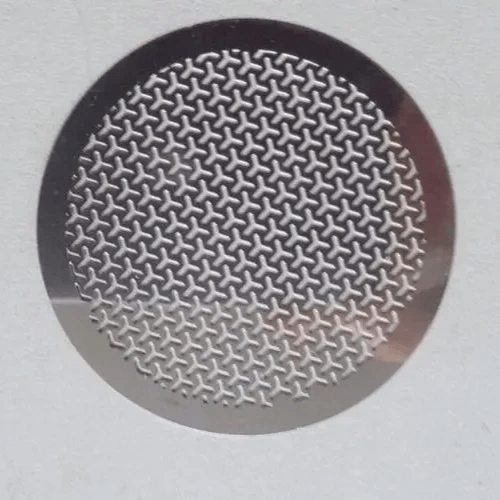Pop filters are used to avoid unwanted sounds from ruining the quality of your recording. All content creators, podcasters, or musicians would benefit from a pop filter to ensure clean audio. There are two main types of pop filters based on the filtration medium: metal and mesh fabric. Metal pop filters utilize either steel or aluminum sheets that are perforated with tiny holes. Mesh pop filters consist of a stretched piece of fabric, usually made from nylon or polyester. Both pop filter types will block plosive sounds and affect frequencies differently.
Your choice of a metal vs a mesh pop filter will have an impact on the quality of your sound, budget, and maintenance plan.
What is Metal Pop Filter?
The metal pop filter is made from solid materials like steel or aluminum instead of fabrics. The metal surface is punched or etched with very tiny holes. The holes stop the air bursts that come from ‘P’ and ‘B’ sounds from getting to the microphone, but allow the sound waves of the voice to pass freely. Broadcast properties commonly choose metal filters for their studios.
Some of the key features of a metal pop filter are:
- Durability: Being metal, it does not tear or stretch over time.
- Easy cleaning: Simply rinsing it under water helps rid it of dust and debris.
- Frequency response: It does not dampen the high frequencies that occur with fabric filters. It maintains natural sounds.
Metal pop filters are much better in terms of moisture resistance than a fabric pop filter. Vocalists who get in close to the microphone often opt for metal pop filters. The solid construction means a metal pop filter can last for several years if cleaned regularly.
What is Mesh Pop Filter?
Mesh pop filters are generally made from materials like nylon and polyester. The woven fabric fibers in these create small openings that hinder plosives effectively. Most recording studios only use the mesh variety of pop filters because these versions are less expensive. Most home podcasters like to use mesh filters before deciding to upgrade.

While mesh filters perform well for speech recording and vocal purposes, they do need to be replaced more often than the metal versions. In the argument of metal vs mesh pop filter, this is often just a matter of cost initially compared to durability and longevity later. Professional studios that find themselves comparing metal vs mesh pop filter durability are most often choosing metal for their regular daily use.
Comparing: Metal vs Mesh Pop Filter
Let’s see how metal vs mesh pop filters compare:

Durability
- Metal: Will survive years of studio daily abuse and never show any wear – there are professional radio stations that have had the same filter for decades.
- Mesh: Begins to deteriorate after months and will develop holes and fabric stretched over time.
- When considering metal vs mesh pop filter durability, metal wins in durability.
Precision
- Metal: Consistently perforated holes that stay the same size, potentially forever, will give you consistent performance from session to session.
- Mesh: Makes holes that are irregular due to the fabric weaves that shift, so some areas filter more or less.
- When looking at metal vs mesh pop filter precision, metal is much better for professional recording applications.
Price
- Metal: $60 as a minimum for a professional filter, but the cost saves you money in the long run. The extended life should eliminate any replacement costs.
- Mesh: $20 on a good day for a filter. But repurchasing at least 3 times per year will cost more.
- Considering the metal vs mesh pop filter price over two years, the metal filter is a better investment.
Metal vs Mesh Pop Filter: Which is Better?
The choice between metal vs mesh pop filter depends on the specifics of your recording requirements and the priority of the budget. Professionals in working studios generally go with metal pop filters due to their reliability and longevity. Creators who record regularly would benefit from the longevity of a metal filter. Casual podcasters may prefer a mesh option for the lower initial cost.
Cost is a primary consideration. Metal pop filters are more expensive at the onset, but will entirely relieve you of the financial burden of replacements. Mesh pop filters are obviously lower upfront, but over time, the need for replacement becomes unbearable.
There are differences between filter types when it comes to sound quality. Metal production will retain frequency response, avoiding dampening of any clarity in the upper range of frequencies. The mesh filter seems to soften the harsh upper-range frequencies, and some vocalists prefer this. Professional applications should demand the accuracy of the metal filter.
The decision of metal vs mesh pop filter translates to your level of commitment.
TMNetch’s precisely designed metal mesh filters are constructed from photo etching technology. Get prototypes in 6 hours with 0.1mm precision. Visit TMNetch and discover your own custom filtration options that fit your needs.
TMNetch Metal Mesh Filters
Since 2011, TMNetch has been producing high-quality, precision metal mesh filters by using modern photo etching technology that creates superior outcomes to the traditional stamping process. TMNetch filters are used in a variety of industries, from medical devices to household appliances. Key manufacturing benefits of TMNetch filters:

- Accurate openings: Holes down to 0.1 mm in diameter with a ±0.02 mm tolerance accuracy
- Prototyping speed: Templates and prototypes are ready within 6 hours after design confirmation
- Custom sizes: Filters 3.0 mm and up to a maximum of 1200 mm
- Single, double, or multi-layer configurations
- All hole shapes and patterns: round, square, honeycomb, and micro hole options
Fortune 500 companies on three continents rely on TMNetch for mission-critical applications.
Visit TMNetch today and see for yourself why the industry leaders choose precision over compromise.
FAQs About Metal vs Mesh Pop Filter
Are metal pop filters better?
In general, metal pop filters provide greater durability and consistency compared to mesh models. When considering durability and usable life, metal pop filters will last for years without needing replacement, and will give consistent filtering performance.
Is there a difference between pop filters?
Yes, there are considerable differences between pop filters. Metal pop filters typically use perforated sheets with uniform holes, rows of holes, or round holes across a flat surface, while mesh pop filters consist of woven fabric.
What material is a pop filter made of?
A pop filter can be made of metal materials, which include aluminum or steel, or fabric materials, including nylon and polyester. When you buy a metal pop filter, it will have holes that are precisely etched or punched into the metal. In a mesh pop filter it has fabric stretched across a metal frame.
Final Thoughts
Ultimately, when you choose between the metal vs mesh pop filter options, an honest assessment of your recording use and budget is needed. Metal pop filters are better suited for a professional creator who values durability and consistency over the long term. Occasional recording artists may find mesh filters sufficient for intermittent use, while not acquiring high-level fidelity. No matter how badly you want quality, sound quality is incredibly important in either case.
